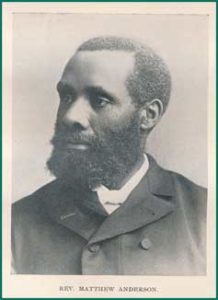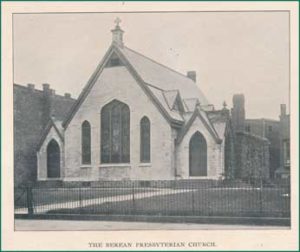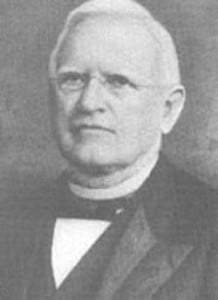A Man Called Peter
by Rev. David T. Myers
The young man was returning from work one starless night in Scotland. Figuring he could save time by cutting across one of the moors, the twenty-one year old began to walk through the field and was startled when he heard his name “Peter” called by someone. Inquiring as to who it was who called him, all he heard was the howling of the wind. He took up his pace again, only to hear an urgent voice again, “Peter!.” He stopped, trying to figure out who was calling him. Suddenly, he stumbled, and in reaching out his hand, found an empty space ahead of him. Not able to see any more clearly, he felt around the edge of the ground and realized that he was on the edge of an abandoned stone quarry. One more step would have resulted in him falling to a certain death in that quarry. The near accident made a powerful impression on Peter Marshall. He had no doubt that the voice was that of God, and that the latter must have a special purpose in his life in sparing him.
Peter Marshall was born in Coatbridge, Scotland, near Glasglow in 1902. His father had died when he was four years of age, but a godly mother brought him up in the faith. He first wished to go to sea but God said “no” to that dream. Then it was to become a missionary in China, but that door was also closed. The door opened was a job in America, to which his widowed mother reluctantly packed his suitcase, commending him to the Lord. After a brief stay in New Jersey, he traveled to Atlanta, George where he took a job at the Birmingham News. It was there that he joined the First Presbyterian Church. Soon, he was busy in the Sunday School, the youth activities, and other ministries. The Presbytery of Birmingham took him under his care, with plans to send him to seminary.
The school of choice was Columbia Theological Seminary, right in a suburb of Atlanta. Wondering how he would afford it, the Men’s class which he was teaching at First Presbyterian, pledged to him that they would financially undergird him in his classes at this historic seminary. He commented, “I feel that my every action is guided by Him who ordains all things for His servants.” He would graduated magna cum laud from Columbia, and be ordained in 1931. Called to a rural church in Covington Presbyterian in Georgia, he stayed there for three years. Then God’s call brought him to Westminster Presbyterian in Atlanta in 1933. There he was known as the “charming young Scotsman with the silver tongue.” He transferred to his last congregation in Washington, D.C. at New York Avenue Presbyterian in 1937. It was there that a door right into the halls of the federal government was opened to him, in that twice he was chosen to be the Chaplain to Congress in 1947 – 1949.
It was in this calling that he was to bear an influence for Christ far beyond any ministry he had up to this time. The post ceased to be mere formality and became a powerful and effective reminder of the truth that God is in control of all things, from the greatest to the least. He believed God was not a Republican nor a Democrat, but that God did want to influence legislation passed by that political body. He became the conscience of the Senate.
After an earlier brush with death from an apparent heart attack, the final summons came on January 26, 1949. Two years later, his wife Catherine would write the award-winning book, A Man Called Peter, which would be made into an Oscar-winning movie.
Words to Live By:
Can we say along with Peter Marshall that we are “determined to give our life to God for Him to use us wherever He wants us?” Such a commitment is necessary for all Christians in their lives here on earth.

 It is regrettable that the Rev. Matthew Anderson is not better known today. You won’t find much about him on the Web, and he doesn’t (yet) have a Wikipedia page. But Rev. Anderson was a most remarkable man, one whose notable accomplishments included founding the Berea Presbyterian Church in Philadelphia, in 1880; then the establishment of a building and loan association to assists blacks in gaining home ownership; followed later by a kindergarten school; a medical dispensary; and a seaside home, along with several church related ministries. W.E.B. DuBois declared of Rev. Anderson’s church that “Probably no church in the city, except the Episcopal Church of the Crucifixion is doing so much for the betterment of the negro.”
It is regrettable that the Rev. Matthew Anderson is not better known today. You won’t find much about him on the Web, and he doesn’t (yet) have a Wikipedia page. But Rev. Anderson was a most remarkable man, one whose notable accomplishments included founding the Berea Presbyterian Church in Philadelphia, in 1880; then the establishment of a building and loan association to assists blacks in gaining home ownership; followed later by a kindergarten school; a medical dispensary; and a seaside home, along with several church related ministries. W.E.B. DuBois declared of Rev. Anderson’s church that “Probably no church in the city, except the Episcopal Church of the Crucifixion is doing so much for the betterment of the negro.” For three consecutive years, the congregation of the Berean church have taken it upon their willing hearts to honor the natal day of their pastor, Rev. Matthew Anderson, D.D. Accordingly, on January 25, a host of friends gathered around the festive board to do him honor while the young people at their table showed their whole-hearted enthusiasm. One birthday cake made a journey from the Canal Zone from Dr. Anderson’s daughter, and was received in excellent condition. The happy faces, light hearts and general atmosphere of congeniality which pervaded served to while away the perfect evening very rapidly. Mr. Arthur Faucet, a young man who grew up in the Sabbath-school, and as an elder in the church, as well as the youngest principal of a public school in Philadelphia, was toastmaster. Speeches were made by Miss Arabella Carter, a Quaker friend of Dr. Anderson; Mr. J.C. Calloway; Mr. H.H. Thomas, a neighborhood guest; Miss H. Frances Jones, president of the W.C.T.U.; Mrs. Lottie A. Smith; Mr. William H. Brown, of the board of directors of Berean Building and Loan Association; Rev. George F. Ellison, of Reeve Memorial; Rev. Charles S. Freeman, pastor of the First African church; Dean L.B. Moore, and Mr. L.W. Underhill, Jr.
For three consecutive years, the congregation of the Berean church have taken it upon their willing hearts to honor the natal day of their pastor, Rev. Matthew Anderson, D.D. Accordingly, on January 25, a host of friends gathered around the festive board to do him honor while the young people at their table showed their whole-hearted enthusiasm. One birthday cake made a journey from the Canal Zone from Dr. Anderson’s daughter, and was received in excellent condition. The happy faces, light hearts and general atmosphere of congeniality which pervaded served to while away the perfect evening very rapidly. Mr. Arthur Faucet, a young man who grew up in the Sabbath-school, and as an elder in the church, as well as the youngest principal of a public school in Philadelphia, was toastmaster. Speeches were made by Miss Arabella Carter, a Quaker friend of Dr. Anderson; Mr. J.C. Calloway; Mr. H.H. Thomas, a neighborhood guest; Miss H. Frances Jones, president of the W.C.T.U.; Mrs. Lottie A. Smith; Mr. William H. Brown, of the board of directors of Berean Building and Loan Association; Rev. George F. Ellison, of Reeve Memorial; Rev. Charles S. Freeman, pastor of the First African church; Dean L.B. Moore, and Mr. L.W. Underhill, Jr. It was for Dean Moore to make a suggestion that surprised every one, and that was that the heavy burdens of the educational work which Dr. Anderson had started needed sympathy, and at his timely and appropriate request, over $100 was raised, which Dr. Anderson accepted, not as a birthday gift, but in his usual sacrificing spirit, as a gift to help with the current expenses of the Berean School. Singular enough was it that the gist of every speech made during the evening pointed to the fact that Dr. Anderson’s seventy-nine years had been spent in arduous labor for his people, and that he had been diligently, persistently and untiringly at one thing all this time.
It was for Dean Moore to make a suggestion that surprised every one, and that was that the heavy burdens of the educational work which Dr. Anderson had started needed sympathy, and at his timely and appropriate request, over $100 was raised, which Dr. Anderson accepted, not as a birthday gift, but in his usual sacrificing spirit, as a gift to help with the current expenses of the Berean School. Singular enough was it that the gist of every speech made during the evening pointed to the fact that Dr. Anderson’s seventy-nine years had been spent in arduous labor for his people, and that he had been diligently, persistently and untiringly at one thing all this time.
 Charles Allen Stillman was born in Charleston, South Carolina to James S. and Mary Stillman on March 14, 1819. He attended Oglethorpe University in Georgia and received his degree in 1841. He then received his divinity degree from Columbia Theological Seminary in 1844 and proceeded to be licensed by Charleston Presbytery later that year. The Second Presbyterian Church of Charleston provided the opportunity for Charles to exercise his ministerial gifts until 1845. In 1845 he was ordained by Tuscaloosa Presbytery to receive a call to the Presbyterian Church in Eutaw, Alabama where he served until 1853. Remaining in Alabama, Rev. Stillman received a call to be the pastor of the Gainesville church where he ministered until 1870. It was in 1863, while he was at Gainesville, that Charles received the Doctor of Divinity degree from the
Charles Allen Stillman was born in Charleston, South Carolina to James S. and Mary Stillman on March 14, 1819. He attended Oglethorpe University in Georgia and received his degree in 1841. He then received his divinity degree from Columbia Theological Seminary in 1844 and proceeded to be licensed by Charleston Presbytery later that year. The Second Presbyterian Church of Charleston provided the opportunity for Charles to exercise his ministerial gifts until 1845. In 1845 he was ordained by Tuscaloosa Presbytery to receive a call to the Presbyterian Church in Eutaw, Alabama where he served until 1853. Remaining in Alabama, Rev. Stillman received a call to be the pastor of the Gainesville church where he ministered until 1870. It was in 1863, while he was at Gainesville, that Charles received the Doctor of Divinity degree from the